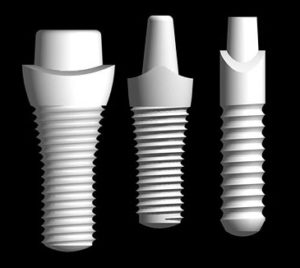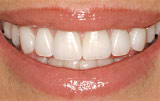How can I make an appointment?
You can call our office directly or email a request for a specific day and time.
How much does a consultation cost?
There is no charge for a consultation. If an examination and x-rays are necessary then our staff can let you know the fee in advance.
Do you take all insurance plans?
Our office accepts and is contracted with most insurance companies. We are happy to call the insurance company for you and check on eligibility and benefits.
Where is the office located?
MORE QUESTIONS BELOW
Do I need to be referred by a doctor?
No referral is necessary. You can call the office directly to make an appointment or make a request through the office email.
What payment options do you offer?
We offer Care Credit, payment plans, all major credit cards and cash.

Two of the major questions that people ask when it comes to dental implants is, “What is the long-term success rate?” and “How long will they last?” With proper care, the average lifespan of a dental implant is 25 years. The long-term success rate is 95%. Whether dental implants last forever is influenced by a variety of factors, such as:
- How well you take care of your dental implants, like daily flossing and brushing, seeing a dentist every six months.
- Avoiding chewing or biting down on extremely hard items, like pen tips or pencils, and not opening things with your teeth.
- How skillful your dentist is at placing your dental implant. Experts know how to evaluate the progress of osseointegration and whether your jawbone has completely absorbed the implant.
- Your lifestyle and overall health.

The exact cause of canker sores is unknown. Some factors may include genetics, allergies, stress, and vitamin and mineral deficiencies. Trauma to the inside of the mouth can result in the development of canker sores. Ill-fitting dentures or braces, toothbrush trauma from brushing too hard, or biting your cheek, may produce canker sores. Certain foods may also be a factor. Citrus or acidic fruits and vegetables can trigger a canker sore or make the problem worse. Foods like chips, pretzels and hard candies have sharp edges that can nick and injure the soft tissue of the mouth.
Canker sores are not the same thing as fever blisters (cold sores).
To treat a canker sore, rinse your mouth with warm water and salt. Most canker sores require no treatment and heal on their own. Over the counter treatments are also available but typically don't speed up the healing process. If the canker sore is present longer than two weeks, make an appointment with Dr. Paquette.

Bleaching products dispensed through dentists’ offices as well as professionally applied (in-office) bleaching products have received the ADA Seal of Acceptance, which indicates that the product has meet ADA guidelines for safety and effectiveness. No over-the-counter products have received the Seal of Acceptance. Over-the-counter bleaching products are not endorsed by the ADA because the organization believes that professional consultation is important to ensuring safe and effective use. No whitening products using lasers currently are on the ADA’s list of accepted products either.

Sedation DentistryThe first step is to make a consultation appointment with Dr. Paquette. Different treatment options will be discussed that can help reduce your anxiety and make your visits as comfortable as possible. Most people have anxiety when going to the dentist. Our office has a lot of experience in helping people become more relaxed. Calming music, essential oils ,nitrous oxide, and our gentle touch are just some of the ways we help make patients forget they are in a dental office.
Over the years there has been some concern as to the safety of amalgam (silver) fillings. An amalgam is a blend of copper, silver, tin and zinc, bound by elemental mercury. Dentists have used this blended metal to fill teeth for more than 100 years. The controversy is due to claims that the exposure to the vapor and minute particles from the mercury can cause a variety of health problems.
According to the American Dental Association (ADA), up to 76% of dentists use silver containing mercury to fill teeth. The ADA also states that silver fillings are safe and that studies have failed to find any link between silver containing mercury and any medical disorder.
The general consensus is that amalgam (silver) fillings are safe. Along with the ADA’s position, the Center for Disease Control (CDC), the World Health Organization, the FDA, and others support the use of silver fillings as safe, durable, and cost effective. The U.S. Public Health Service says that the only reason not to use silver fillings is when a patient has an allergy to any component of this type of filling. The ADA has had fewer than 100 reported incidents of an allergy to components of silver fillings, and this is out of countless millions of silver fillings over the decades.
Although studies indicate that there are no measurable health risks to patients who have silver fillings, we do know that mercury is a toxic material when we are exposed at high, unsafe levels. For instance, we have been warned to limit the consumption of certain types of fish that carry high levels of mercury in them. However, with respect to amalgam fillings, the ADA maintains that when the mercury combines with the other components of the filling, it becomes an inactive substance that is safe.
There are numerous options to silver fillings, including composite (tooth-colored), porcelain, and gold fillings. We encourage you to discuss these options with your dentist so you can determine which is the best option for you.
Bad breath (halitosis) can be an unpleasant and embarrassing condition. Many of us may not realize that we have bad breath, but everyone has it from time to time, especially in the morning.
There are various reasons one may have bad breath, but in healthy people, the major reason is due to microbial deposits on the tongue, especially the back of the tongue. Some studies have shown that simply brushing the tongue reduced bad breath by as much as 70 percent.
What may cause bad breath?
- Morning time – Saliva flow almost stops during sleep and its reduced cleansing action allows bacteria to grow, causing bad breath.
- Certain foods – Garlic, onions, etc. Foods containing odor-causing compounds enter the blood stream; they are transferred to the lungs, where they are exhaled.
- Poor oral hygiene habits – Food particles remaining in the mouth promote bacterial growth.
- Periodontal (gum) disease – Colonies of bacteria and food debris residing under inflamed gums.
- Dental cavities and improperly fitted dental appliances – May also contribute to bad breath.
- Dry mouth (Xerostomia) – May be caused by certain medications, salivary gland problems, or continuous mouth breathing.
- Tobacco products – Dry the mouth, causing bad breath.
- Dieting – Certain chemicals called ketones are released in the breath as the body burns fat.
- Dehydration, hunger, and missed meals – Drinking water and chewing food increases saliva flow and washes bacteria away.
- Certain medical conditions and illnesses – Diabetes, liver and kidney problems, chronic sinus infections, bronchitis, and pneumonia are several conditions that may contribute to bad breath.
What can I do to prevent bad breath?
In most cases, your dentist can treat the cause of bad breath. If it is determined that your mouth is healthy, but bad breath is persistent, your dentist may refer you to your physician to determine the cause of the odor and an appropriate treatment plan. |
Ask us a Question
We are happy to answer any oral health related questions.

